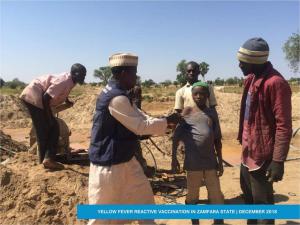Nigeria set to vaccinate 25 million people, its biggest yellow fever campaign ever
24 January 2018, Abuja - The Government of Nigeria will launch a mass vaccination campaign to prevent the spread of yellow fever on Thursday (January 25) with support from the World Health Organization (WHO) and partners. More than 25 million people will be vaccinated throughout 2018, in the largest yellow fever vaccination drive in the country’s history.
The immunization plan is part of efforts to eliminate yellow fever epidemics globally by 2026. The preventive campaign will use vaccines funded by Gavi, the Vaccine Alliance, and will be supported by UNICEF. It will begin on 25 January in Kogi, Kwara and Zamfara states, and then move to Borno state where the campaign will focus on camps for internally displaced persons and surrounding host communities. More than 8.6 million people will be vaccinated in the four states in the coming days.
“The goal of the Yellow Fever Preventive Mass Vaccination Campaign is to reduce yellow fever transmission by achieving 90% coverage in implementing States and Local Government Areas in line with the strategy for the Elimination of Yellow fever Epidemics by 2026,” said Dr Faisal Shuaib, Executive Director of National Primary Healthcare Development Agency.
Yellow fever is a vaccine-preventable acute viral haemorrhagic disease transmitted by infected mosquitoes. The current yellow fever outbreak in Nigeria began in Ifelodun, Kwara State in western Nigeria in September 2017. By early January 2018, a total of 358 suspected cases had been reported in 16 states, with 45 deaths.
In late 2017, Nigeria vaccinated more than three million people in an initial emergency yellow fever vaccination campaign with the aim of quickly containing the outbreak. However, the yellow fever virus continues to circulate in different parts of the country where people remain largely unprotected.
WHO is supporting the vaccine drive by training thousands of healthcare workers on how to administer the vaccine, helping to track cases of yellow fever and providing coordination and logistical support for this highly complex operation.
“With a single dose of vaccine, an individual is protected for life against yellow fever,” said Dr Wondimagegnehu Alemu, WHO Representative in Nigeria. “This is a massive undertaking which took weeks of planning. Nearly 3000 vaccination teams are being deployed across the four states participating in the campaign.”
EYE: setting sights for 2026
A coalition of partners developed the Eliminate Yellow fever Epidemics (EYE) Strategy, steered by WHO, Gavi and UNICEF, to protect at-risk populations, prevent international spread and contain outbreaks rapidly. As a zoonosis (any disease or infection that is naturally transmissible from vertebrate animals to humans), yellow fever cannot be eradicated, but epidemics can be eliminated if population immunity levels are effectively raised through mass vaccination and sustained by routine infant immunization. The EYE Strategy’s goal is to eliminate yellow fever epidemics globally by 2026.
A second phase of the mass vaccination campaign in Nigeria is expected to occur later in 2018. This is part of a phased approach to build immunity among residents.
“This should provide high population immunity nationwide. WHO calls for partners’ continued support to protect the Nigerian people and end yellow fever epidemics by 2026,” Dr Alemu said.
Communications Officer
WHO Nigeria
Email: hammanyerok [at] who.int (hammanyerok[at]who[dot]int)
Communications Manager
WHO Regional Office for Africa
Email: okas [at] who.int (okas[at]who[dot]int)
Tel: +242 06 508 1009



